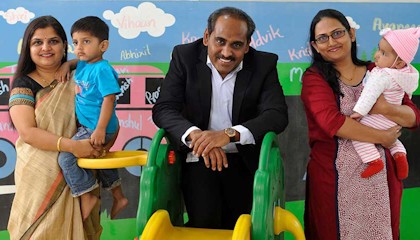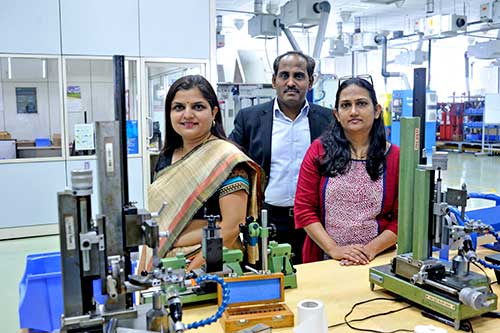Child’s play creates jobs
At Sandvik's manufacturing facility in Pune, the day care center has opened up big opportunities to attract employees with diverse perspectives. One way of walking the talk when it comes to diversity and inclusion.

Anshul is barely 3 years old, but when he wakes up every morning he says, "I have to go to Sandvik."
No, the Sandvik headquarters in Pune, India, does of course not employ children. But ever since his mother, Sonali Mulay, General Manager, Technology Management, returned from maternity leave, Anshul has been accompanying her to the spacious and cheerful day care center, set up in 2010.

"He gets milk and meals every two hours, participates in activities such as storytelling and has developed good habits," Mulay says. "Unlike his sister, who I had to feed till she was 3, Anshul has fed himself since he was 1, which is amazing."
In the industry in India, Mulay stands out. In her team of 75, only two are women. When Angala Srinivasan, Sandvik's Site Director, SMS Operations, began looking for a mechanical engineer with 15 years' experience and said that he wanted to hire a woman, in line with the company's policy of diversity and equal opportunity, he was told that such a person didn't exist. Still he persisted and found Mulay, whose qualifications were a perfect fit. The hiring process was almost complete when Mulay found she was expecting a child.
They now faced the challenge that, under Indian law, Sandvik gave 12 weeks of maternity leave, but the company day care center only took in babies who were at least 6 months old. But Srini, who was part of the policy-making committee, pushed for changes, saying, "If we really want to encourage women to join the organization, we have to try harder." The result was 20 weeks of maternity leave and a change in the entrance age for the day care center to 4 months. Mulay became the first employee to utilize the privilege.

Initially the day care center was open only to help female employees, but now it is open to any employee with a child until that child is 6 years old. Now 30 Sandvik employees use its services, which have been outsourced to Purple Patch, a trusted brand in Pune.
Srini is keen to encourage other women to apply for positions at the company. In March 2014, when Medha Takawale, in the final round of interviews for a post as HR Business Partner, also discovered she was expecting a child, Srini reassured her about the company policy of 20 weeks of maternity leave, medical insurance and of course the day care center. These factors relieved most of her tensions, she says.
"They have a canteen too, so I don't have to cook early in the day," she says.
Takawale returned to work in January 2015, happy that her son is well taken care of. "The center calls me when I'm needed for my baby," she says.
Championing diversity in India has not been easy. It wasn't until 2003 that Sandvik hired its first female manager, an HR executive, to join the all-male team of 14 managers. India doesn't have too many senior female mechanical engineers and it's a challenge to recruite women to non-traditional female jobs, explains Sandvik's Vaishali Surve, Associate VP, Compliance, who is also leading the diversity and inclusion portfolio for India.
Another drawback is old legislation prohibiting women from working on the shop floor in engineering industries after 7 p.m. But in an effort to bring in more women, Sandvik has employed 25 women in production and allied services for the day shift.
Surve says that a group that is diverse tend to be more committed, passionate and ethical. Sandvik India keeps pushing for diversity across gender (in Pune there are 108 women out of a total of 1,136 employees), regions and cultures, and the latest addition to its management team is a woman CFO.
A diverse organization where everyone is included, and which is built on its members differences, is able to meet the challenges and requirements of current and future customers.